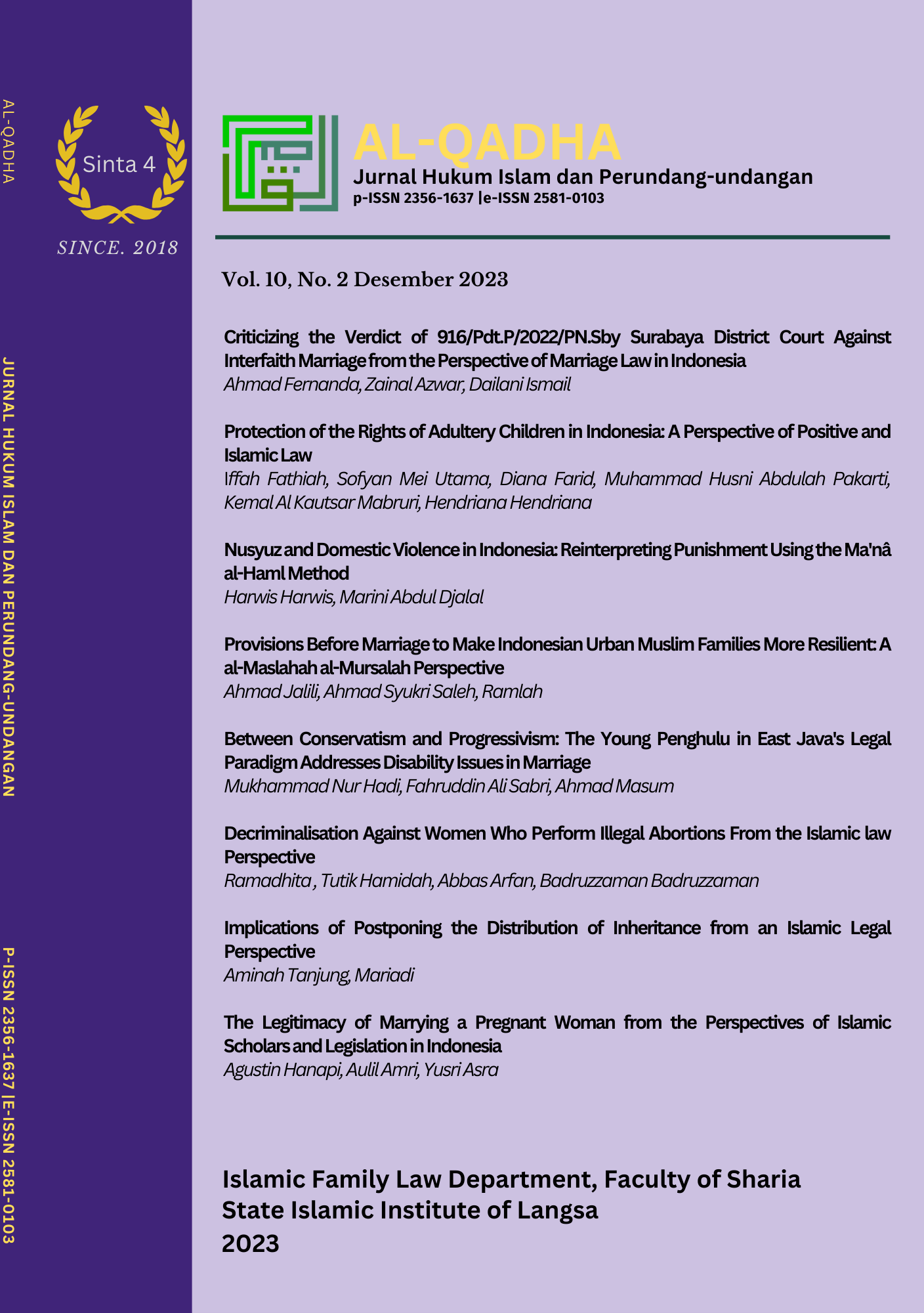Main Article Content
Abstract
The phenomenon of parents abandoning their children due to adultery is quite common these days. In the marriage legal system in Indonesia, children born outside a legal marriage cannot be recognized as legitimate children, so their civil aspects follow those of their mother. Children resulting from adultery lose some of their rights as children of a father, and this has the potential to disrupt their future. This research aims to analyze the rights of children resulting from adultery and whether there are solutions that can be taken so that children resulting from adultery still receive their rights even without a cross-breed relationship with their biological father. The research method used is a library research with a sociological-legal approach. Data sources were obtained from the law and several important articles related to this research problem. Apart from that, this article also uses the results of empirical research to strengthen the arguments in this research. Based on the research results, it was found that, from various studies, there is often a neglect of children's rights as a result of adulterous relationships. Men tend to leave their partners, and in the end, women often become single parents to meet the child's needs. Legally, the state can punish the adulterer (biological father) for being responsible for the needs of the child resulting from his adultery.
Keywords
Article Details

This work is licensed under a Creative Commons Attribution-NonCommercial 4.0 International License.
References
- Ahmad, Rofiq. Hukum Islam Di Indonesia. Jakarta: PT Raja Grafindo Persada, 1997.
- Arini Zubaidah, Dwi. “Childfree Marriage in the Perspective of Maqashid Asy-Syari’ah.†Al-Qadha : Jurnal Hukum Islam Dan Perundang-Undangan 10, no. 1 (June 13, 2023): 79–93. https://doi.org/10.32505/qadha.v10i1.5852.
- Basri, Halimah, Andi Miswar, Hamka Hasan, Mustaqim Pabbajah, and Subehan Khalik. “Inheritance Rights of Women in Makassar Society: A Study of Living Qur’an and Its Implications for Islamic Law.†Samarah: Jurnal Hukum Keluarga Dan Hukum Islam 6, no. 2 (2022): 537. https://doi.org/10.22373/sjhk.v6i2.13882.
- Bilalu, Naskur, Ridwan Jamal, Nurlaila Harun, and Syahrul Mubarak Subeitan. “Compilation of Islamic Law as Judge’s Consideration at a Religious Court in North Sulawesi, Indonesia.†Samarah 6, no. 2 (2022): 514–36. https://doi.org/10.22373/sjhk.v6i2.12441.
- Elfrida, Rinanti. “Perlindungan Anak Zina Menurut Perspektif Hukum Islam Dan Hukum Positif.†UIN Raden Intan Lampung, 2017.
- Farid, Diana, Muhammad Husni Abdulah Pakarti, Hendriana, and Iffah Fathiah. “Interfaith Marriage: Subjectivity of the Judge in Determination of No. 454/Pdt.p/2018 Surakarta District Court.†Al-Istinbath: Jurnal Hukum Islam 7, no. 2 (2022): 347–62. https://doi.org/10.29240/jhi.v7i2.4574.
- Farid, Diana, Muhammad Husni Abdulah Pakarti, Hendriana Hendriana, and Iffah Fathiah. “Interfaith Marriage: Subjectivity of the Judge in Determination of No. 454/Pdt.p/2018 Surakarta District Court.†Al-Istinbath: Jurnal Hukum Islam 7, no. 2 November (December 1, 2022): 347–62.
- Farid, Diana, Muhammad Husni Abdulah Pakarti, Hendriana Hendriana, Iffah Fathiah, and Moh Imron Taufik. “Praktik Pernikahan Dan Perceraian Di Bawah Tangan.†Mutawasith: Jurnal Hukum Islam 6, no. 1 (July 27, 2023): 53–69. https://doi.org/10.47971/mjhi.v6i1.612.
- Farid, Diana, Muhammad Husni Abdulah Pakarti, Usep Saepullah, and Hendriana Hendriana. “Peran Kanal Online Dalam Edukasi Pranikah.†FASTABIQ: JURNAL STUDI ISLAM 3, no. 2 (June 22, 2022): 81–93. https://doi.org/10.47281/fas.v3i2.119.
- Ghozali, Abdul rahaman. Fiqh Munakahat. Jakarta: Kencana, 2008.
- Hajar Atsqalani, Ibn. Hadith Bulughlul Maram. Cimahi: CV. Gema Risalah Press:, 2008.
- Hamidi, Mu’ammal, and Imron A. Manan. Tafsir Ayat Ahkam. Surabaya: PT. Bina Ilmu, 2011.
- Husaini, Adian. Stoning in the Flow of Shahwat Culture Application of Sharia Law in Indonesia in Review of Islamic Sharia, Positive Law and Global Politics. Jakarta: CV. Pustaka al-Kautsar, 2001.
- Ideham, Wahidah. “Substitute Heirs in the Compilation of Islamic Law: An Overview from Gender Equality Perspective Case Study of the Religious Courts in Banjarmasin.†Samarah 6, no. 2 (2022): 1046–64. https://doi.org/10.22373/sjhk.v6i2.12466.
- Isfahani, Al-Raghib al al-. Mu’jam Mufradat Alfazh Al-Qur’an. Kairo: Dar al-Katib al-’Arabiy, n.d.
- Jauhari, Iman, Zamakhsyari Bin hasballah Thaib, M. Jafar, TM Ali Bahar, M. Jamil, Muhammad Yusuf, and Zaini Dahlan. “The Qur’an and Islamic Legal Perspectives on Child Protection.†Pharos Journal of Theology 104, no. 4 (2023). https://doi.org/10.46222/pharosjot.104.417.
- Melissaris, Emmanuel. “The More the Merrier? A New Take on Legal Pluralism.†Social & Legal Studies 13, no. 1 (March 2004): 57–79. https://doi.org/10.1177/0964663904040192.
- Muhazir, Muhazir. “Dualisme Peraturan Perceraian di Aceh: Kontestasi Fatwa dan Hukum Negara.†Al-Ahwal: Jurnal Hukum Keluarga Islam 13, no. 2 (December 28, 2020): 198–208. https://doi.org/10.14421/ahwal.2020.13208.
- ———. “Islam, Fatwa Dan Negara: Meretas Pluralisme Hukum Perceraian Di Aceh.†Al-Manahij: Jurnal Kajian Hukum Islam 15, no. 2 (December 1, 2021): 233–48. https://doi.org/10.24090/mnh.v15i2.5150.
- Nasaiy Aziz, Nasaiy Aziz, and Muksal Mina Muksal Mina. “Nasab Anak Yang Lahir Di Luar Nikah: Analisis Fatwa MPU Aceh Nomor 18 Tahun 2015 Dan Keputusan MK Nomor 46/PUU/-VIII/2010.†SAMARAH: Jurnal Hukum Keluarga Dan Hukum Islam 1, no. 1 (July 17, 2017): 72. https://doi.org/10.22373/sjhk.v1i1.1571.
- Nasution, Adelina, Pagar Pagar, and Asmuni Asmuni. “The Disparity Of Judge’s Verdict On Child Custody Decision In Aceh Sharia Court.†Samarah: Jurnal Hukum Keluarga Dan Hukum Islam 6, no. 2 (2022): 890. https://doi.org/10.22373/sjhk.v6i2.12758.
- P, Fuji Rahmadi. “Teori Keadilan (Theory of Justice)Kajian Dalam Perspektif Filsafat Hukum Islam Dan Barat.†Jurisprudensi: Jurnal Ilmu Syariah, Perundang-Undangan Dan Ekonomi Islam 10, no. 1 (June 30, 2018): 62–76. https://doi.org/10.32505/jurisprudensi.v10i1.871.
- Rahajaan, Jakobus Anakletus, and Sarifa Niapele. “Dinamika Hukum Perlindungan Anak Luar Nikah Di Indonesia.†PUBLIC POLICY (Jurnal Aplikasi Kebijakan Publik & Bisnis) 2, no. 2 (2021): 258–77. https://doi.org/10.51135/publicpolicy.v2.i2.p258-277.
- Rusyd, Ibnu. Bidayatul Mujtahid wa Nihayatul Muqtashid. Beirut: Dar Al-Kutub Al-Islamy, 1988.
- Suryati, and Teguh Anindito. “Weak Protection of Civil Rights Zina Children in Indonesia.†Islam Universalia: International Journal of Islamic Studies and Social Sciences 4, no. 1 (2022). https://doi.org/10.56613/islam-universalia.v4i1.210.
- Syarbaini, Ahmad. “Teori Ta’zir Dalam Hukum Pidana Islam.†Ius Civile: Refleksi Penegakan Hukum Dan Keadilan 2, no. 2 (April 25, 2019): 1–10. https://doi.org/10.35308/jic.v2i2.967.
- Wulandari, Riri. “Status Nasab Anak Di Luar Nikah Perspektif Mazhab Hanafi Dan Mazhab Syafi’i Dan Implikasinya Terhadap Hak-Hak Anak.†Undergraduate, UIN Raden Intan Lampung, 2018.
- Yusmalinda, Yusmalinda, Syawaluddin Ismail, Muhammad Rusdi bin Muhammadiah, Muhammad Firdaus, and Muhazir Muhazir. “Islam Dan Sosial Kontrol: Menelisik Penerapan Syariat Islam Di Aceh.†Jurnal El-Qanuniy: Jurnal Ilmu-Ilmu Kesyariahan Dan Pranata Sosial 9, no. 1 (July 6, 2023): 145–61. https://doi.org/10.24952/el-qanuniy.v9i1.7711.
